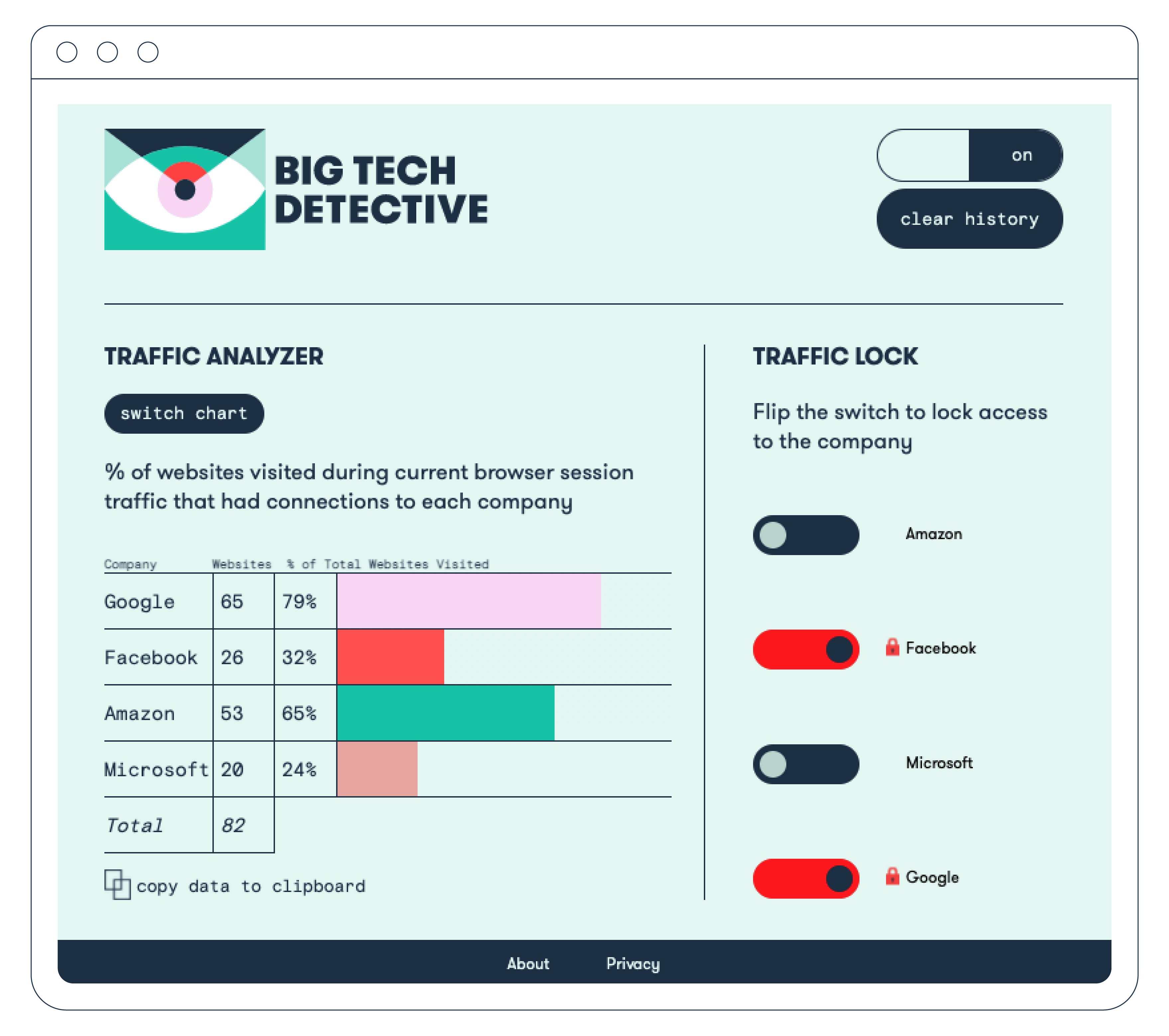


The following are instructions for Chrome. Click here for Firefox.
As Big Tech Detective is not on the Chrome store (yet), installing it requires "sideloading" it into Chrome.
As you browse the internet, Big Tech Detective will alert you if the website you are on is exchanging data with Big Tech by identifying and measuring connections to internet protocol (IP) addresses owned by Amazon, Facebook, Google, and Microsoft.
The overlay page will alert you when a webpage is exchanging data with Amazon, Facebook, Google, or Microsoft. While the tool is on, the extension window counts connections as you browse the internet in real time, even if you do not choose to lock traffic to and from any of the four companies. In the extension window, the “websites view” of the Traffic Analyzer graph shows you the percentage of websites that have connections to each company. Toggling to the “packets view” will show you the breakdown of the volume of data going to each company.
If you would like to see exactly which IP addresses are being pinged on each webpage, toggle the lock switch for the companies and you can click the “copy data to clipboard” button in the lower left corner to pull back the curtain even further.
Think of this tool as x-ray vision revealing the guts of a website. You may have grown accustomed to seeing advertisements served in the sidebar of a website, but this tool shows the role Big Tech plays in serving you those ads. This tool may also alert you to the role that Big Tech plays in hosting some of your favorite websites on their servers.
Big Tech Detective tracks our best guesses about who controls the content you interact with as you browse the internet based on domain ownership. You can turn off the app and stop tracking data by closing the app’s pop up window.
To identify, flag, and count these connections, the app tracks information on the requested URLs, the company owner, and associated packet counts. All information is stored locally on your computer, and it does not contain any information that identifies you or your browsing history except the number of packets that your browser sends to the tech giants.
If a website triggers a Big Tech Detective lock, it may be because one of the tech monopolies owns it. You may know that Facebook owns Instagram and WhatsApp, but did you know that Google owns YouTube, Microsoft owns LinkedIn, and Amazon owns Twitch? Part of the way these companies consolidate their power is by buying up smaller, potential and nascent competitors.
Another reason a website might be locked is that they are using products or services from one of these companies. Amazon Web Services, for instance, is a cloud computing service that powers many high traffic websites, including Netflix , and is a huge, often unseen part of their business. In the first quarter of 2020, AWS accounted for only 13.5% of Amazon’s total revenue, but was responsible for a staggering 77% of its operating income.
If you use this tool for even a short time, it becomes clear that there’s a whole economy of data online obscured from view — and if you have all four companies locked, it’s virtually impossible to browse the internet as you normally would.
If you want to load a page, simply toggle the lock switch to off, or close the pop up and reload.
Based on the groundbreaking reporting by Kashmir Hill & Dhruv Mehrotra in Gizmodo, this browser extension seeks to replicate the experience of the custom-built VPN that allowed Hill to avoid using each of the tech giants for an entire week at a time. Together with the Anti-Monopoly Fund at the Economic Security Project , Mehrotra has worked with developer Alden Rivendale Jones and designer Emily Lin to bring this extension to the public at large.
The majority of the data this tool analyzes is from advertising and cloud services. Amazon Web Services (AWS) is the dominant cloud platform, with the two other most common infrastructure providers Microsoft Azure and Google Cloud Platform (GCP) growing at rates double that of Amazon. Facebook and Google have long been dominant in digital advertising, but Amazon is also starting to gain a foothold in this market as well.
While Apple exercises monopoly power in other ways, and is the defendant in a civil suit filed by the gaming company Epic for anticompetitive behavior, it doesn’t account for a significant portion of data in a web browsing experience.
We thought long and hard about building this tool for Chrome, which is itself a Google product. In the end, Google Chrome’s market share in web browsing was itself the most convincing argument: as of August 2020 , Chrome is the leading U.S. desktop browser with 58.6% of the market, followed by Safari at 15.8%, with Edge, Firefox, and Internet Explorer picking up the rest. (In search, Google is even more dominant , with 81% of all general search queries in the US on desktop and a whopping 94% on mobile.) While these stats illustrate the consolidated landscape and market dominance these companies enjoy, we ultimately decided that reaching as many people as possible with this tool was paramount.
Big Tech Detective does not store or retain any information about your browsing history on our servers. The only data sent to our servers are the IP addresses of the requested webpage and the content it loads — for example, Facebook pixels and Google Analytics scripts, fonts, and images. We use these IP addresses to determine the companies behind the content you are seeing. Before we send any data to our server, we first try to figure out ownership locally using a list of common IP addresses and domains. In the event that we cannot identify a particular IP address, we take precautions to only send minimal amounts of data to our server. The IP addresses are encrypted with HTTPS and sent to a Cloud Application Platform called Digital Ocean.
The information we analyze cannot be used to identify you. We do not use tracking cookies or advertising and analytics technology.
Big Tech Detective also stores some information on your computer that is not shared with anyone else. This information consists of the visited website and the requested asset URLs. You can delete this information by using the “Clear History” button on the Big Tech Detective extension.
If you are concerned about accessing particularly sensitive websites, please turn off or disable Big Tech Detective or use another browser.
When you install the Big Tech Detective and navigate to a webpage, the Chrome extension will inspect the IP addresses of where the page retrieves data from and where it sends data to. This is achieved using Google Chrome’s built in webRequest API .
Big Tech Detective then determines if the requested IP address belongs to Facebook, Google, Microsoft, or Amazon by querying a remote database containing many millions of addresses owned by the tech giants. If the requested IP address is in the database, we flag it and surface a message to the user about its ownership. Our lookup database was compiled by leveraging the Internet Assigned Numbers Authority (IANA) whois server. Specifically, we query the WHOIS database by querying AS numbers of the tech giants to compile a list of their IP space.
We send only the requested IP address to our API to handle the querying of the Big Tech Detective database. We use an external server to host the database of IP addresses covered for two reasons. The first is that the data would slow down the browsing experience if packaged with the extension. There are about 52,000 Classless Inter-Domain Routing (CIDR) blocks of addresses in the database, and storing them in a way that is accessible to frequent queries would use a considerable amount of memory that slows down overally browsing considerably (~1GB). The second reason is that, as we are currently distributing the extension to be side-loaded, if we packaged the IP data with the extension, any updates to the data would need to be re-installed.
In the absence of strong federal privacy laws, there’s only so much you can do to try to stop these companies from collecting and using your data. However, you can use more privacy-protective browsers like Mozilla Firefox or Brave, update your privacy settings on your apps, or delete your data from their companies. For instance, you can choose how long Google can retain your search and location data .
For more large-scale change, we’ll need to ask our federal regulators and Congress to step up and rein in the power of these monopolistic companies. Among the many strong recommendations laid out by the House Judiciary Antitrust Subcommittee’s October report, structural separation to eliminate the conflicts of interest that these companies own will be an important solution.
Structural solutions of this nature will require enforcement actions from the Federal Trade Commission or Department of Justice and/or new legislation passed by Congress, both of which are advocated by many policy experts and activists. Even Tim Bray, former AWS engineer and Vice President, has called for AWS to spin off from Amazon to circumvent concerns from customers about Amazon’s insight into usage metrics.
To find out how you can support these calls or sign a petition, keep scrolling for our Call to Action.
Some challenges to get started: Are you able to stream music? Can you send an email? Can you pay a parking ticket?
◑ Join Media Justice and Break Up With Amazon
◑ Learn more about how to gain Freedom from Facebook and Google
◑ Stop Amazon’s surveillance state with Fight for the Future
◑ Call on Facebook to Stop Hate for Profit
◑ Sign Color of Change’s petition to break up big tech
◑ Follow the many stories of everyday people who are holding Amazon accountable — workers, small businesses, and community members — organizing to deliver democracy at Athena
Click here to find your representatives on Twitter.